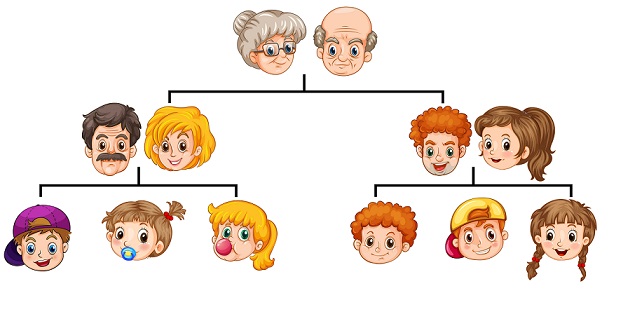by Gordon Jeremiah Berry
Today in the United States, first cousin marriages are widely considered to be taboo. Yet each year within the U.S, 0.2 percent of marriages are to first cousins. This change in customs regarding first cousin marriage’s acceptance began in some parts of the Western world around the mid-19th Century and quickly spread around the U.S.
One main point of view was the thinking that there would be a potential increase in birth defects for any offspring. In more modern times, this has proven to be false. According to the Clinical Genetics Handbook, “the increased risks with regards to having children born with birth defects are nearly non-existent in cases compared with non-cousin marriage. Some studies have shown that “potentially life-threating birth defects” resulted in only a 6% chance, compared to a 3% chance for the population as a whole.” It is about the same risk as a woman having a baby when she is 40 over when she is still in her early 30s.

Inside of the U.S., there are many States where marriage to any cousin is legal. These states are: Alabama, Alaska, California, Colorado, Connecticut, District of Colombia, Florida, Georgia, Hawaii, Maryland, Massachusetts, New Jersey, New Mexico, New York, Rhode Island, South Carolina, Tennessee, Vermont, and Virginia. In North Carolina, first cousin marriage is legal, but double cousin marriage is prohibited. In Arizona, it is allowed, if both are 65 or older, or if one is unable to reproduce. In Illinois, if both are 50 or older, or one is unable to reproduce. In Indiana, if both are at least 65. In Maine, if the couple obtains a physician’s certificate of genetic counseling. In Utah, if both are 65 or older, or if both are 55 or older and one is unable to reproduce. In Wisconsin, if the woman is 55 or older, or one is unable to reproduce. The States where first cousin marriage is prohibited are Arkansas, Delaware, Idaho, Iowa, Kansas, Kentucky, Louisiana, Michigan, Minnesota, Mississippi, Missouri, Montana, Nebraska, Nevada, New Hampshire, North Dakota, Ohio, Oklahoma, Oregon, Pennsylvania, South Dakota, Texas, Washington, West Virginia, and Wyoming.
Throughout the Middle East, and in predominately Muslim Countries, first cousin marriage is more of a normal occurrence, especially in Pakistan, and Burkina Faso; it is still very common in Afghanistan, Mauritania, Sudan, Yemen, Oman, India, Sri Lanka, Iran, United Arab Emirates, Qatar, Saudi Arabia, Iraq, Syria, Turkey, Jordan, Egypt, Libya, Tunisia, Algeria, Morocco, and Guinea. So then, what about Muslim Immigrants that have married their first cousin in their home countries and then sponsor them to the U.S.
In each case related to any Immigration law(s), there are always very complex issues. In cases relating to marriage, when it is tied in with not only with a custom practice but has a religious backdrop, Constitutional Authority is key and you would have to look no further than the 1st Amendment. “Congress shall make no law respecting an establishment of religion, or prohibiting the free exercise thereof; or abrading the freedom of speech, or the press; or the right of people peaceably to assemble, and to petition the government for a redress of grievances.”
Case by case can vary greatly—for instance, if the immigrant has become a U.S. Citizen, if they are in the U.S. on a work and or student visa, and so on. The United States Customs and Immigrations Service or (USCIS) handles all issues related to Immigration. Officials from within are able to make snap judgements on cases about any Immigration circumstance(s).
There are situations when a “Spouse Petition” or I-130 Immigration form maybe rejected, USCIS might think they are married to bring the family member to the U.S, which will then cause the denial. For the most part, this is a non-issue except as it relates to the “bona fides” at the visa interview. They will approve a petition for a first cousin marriage provided the questions on the I-130 were answered honestly and they would otherwise qualify. Such as the U.S. Poverty Guidelines income requirements, and any and “all” “documentary evidence showing a person’s legitimacy and credentials”, that they are and must be very abundant. Most important of all, “having an Immigration Attorney is absolutely vital”. Otherwise, the amounts of endless paperwork is easily able to trip up anyone that is not “very similar” and up to date with all law matters concerning the immigration process. In other words, this is a way “to petition the government for a redress of grievances.”
The U.S. and any state within will recognize marriages “legally performed in other countries between one man and one wife.” The “legality” and terminology within the law will always continue to change, as will the process itself. The challenges with Immigration are more concentrated on security concerns than possible scrutiny over an Immigrates countries local customs. This way the multicultural benefits and cultural assimilation aspects of living in the U.S will hopefully continue for many years to come.
About the Author
Gordon Jeremiah Berry resides in Tampa, Florida. An avid reader and intense researcher. Mr. Berry looks for the deeper meaning and reasoning behind all things. He favorite saying is “Love must always win out!”



You cite one study which has shown the risk of life threatening deformity in first cousin marriages to be the same as for women over 40. If this is the case, why is it that in the specialist paediatric clinic where I work in the UK, the vast majority of children (estimate 75%) I see are have parents who are first cousins and of Pakistani origin. It is extremely rare to see parents over 40.. Other hospital clinicians will echo this.
When generation after generation have children by first cousins, the rate of disability increases dramatically. Several other studies have shown a much greater risk than the one you have quoted-As many as 30% of children born with a disability in the UK are Pakistani, when they comprise of only 5% of the population
I have lost count of the families of Pakistani origin who have 3 or more children all with the same inherited disability and continue to have more children. This is heartbreaking to see children suffer with such disabilities and it is a burden on the state and the National Health Service.
Unfortunately successive UK and US governments are reluctant to discuss this for fear of upsetting Muslim communities and being branded as racist by the left wing press. It should be banned.
KM, good point. I live in Pakistan and in a conservative town where most marriages are first-cousin. I personally won’t echo what you say because in my observation such disabilities are rare. However I agree banning first-cousin marriages and other special considerations given to minorities based on the categorical respect for state law. It doesn’t make sense to me to accommodate every religion’s special needs – and I am surprised at the inconsistency because Muslims also believe in polygamy but I don’t know if US law allows for keeping 2 wives at the same time in US among Muslims. Law needs to be for everyone